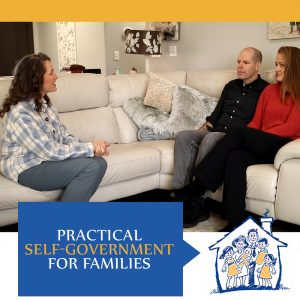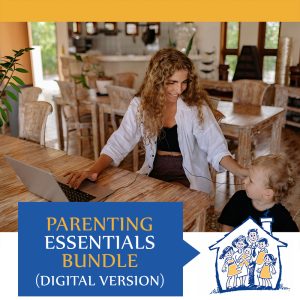Are You Teaching Children Discernment?
An online school teacher was recently giving me the highlights of his career. He proudly told me that his favorite part of his job was that he gets to teach children discernment. I could see how this would be exciting for him but was also instantly concerned. A series of “what if” questions came to mind.
- What if the teacher had a different moral compass than the child or the child’s parents? Couldn’t that confuse discernment?
- What if the teacher taught discernment solely through the lens of science and fact finding instead of incorporating the spiritual/inspiration element?
- What if the spiritual elements the teacher brought in weren’t in alignment with the family’s spiritual truths?
- What if the parents didn’t know the teacher was focusing on teaching their child discernment and so didn’t detect what the child was discerning?
- What if the child didn’t know that there are multiple ways for a person to feel like they are discerning truth and was led down a blind path?
- What if the child wasn’t aware that a person’s worldview influences their discernment and fell away from their family’s worldview?
- What if the child didn’t know the teacher had a different worldview than their family and got confused or misled?
Discernment means, “…distinguishing one thing from another, as truth from falsehood, virtue from vice; acuteness of judgment; power of perceiving differences…” (Webster’s 1828 dictionary) The power to discern is not to be taken lightly. It’s one of a human’s greatest powers. Discernment defines our morality, values, and beliefs, and is the root of our decision making and problem-solving ability. So, whoever teaches your child discernment, whether it is you, the media, peers, or teachers, is literally wielding the power to form your child’s beliefs, values, morality, passions, and actions.
In order to teach your child discernment and prepare them to discern what other sources are teaching them, I recommend the following 8 principles.
8 Principles That Influence Discernment
1- Develop a valuable, bonded relationship to maintain position of influence in your child’s life. Whoever, or whatever, is bonded the most closely to a child/person has the greatest influence on the heart and mind of the child. Both heart (spirit) and mind work together for discernment.
2- Identify and understand different belief systems. Fully understand worldviews and how your worldview differs from others. Then teach worldviews to your child too through simple comparisons that point back to principles. If you only know your own worldview, but not how it compares to other worldviews, then you can’t come across as fully knowledgeable to your child. This lack of understanding points them toward other sources for more truth and can mislead them. If you need help with your worldview research, I recommend the latest edition of, “Understanding the Times” by David Noble.
3- Stay spiritually connected to real truth. Parents who spend a portion of each day studying scripture/prophetic counsel and inspired sources become confident in their own morals and beliefs and have a tendency to live what they believe more than others who don’t immerse themselves in inspired texts.
4- Live what you believe, no matter how inconvenient or different it is. Children are looking for truth. Even though truth can and should be told to someone, it is best taught through action. A person who lives according to truth is always the best teacher. So many children fall away from their parent’s morals because the parent doesn’t consistently live the morals they profess and seems inconsistent with the truths they share. Stay committed to living pure truth and your children will more likely develop the confidence to do the same. This isn’t to say that if a child falls away from their parent’s beliefs that the fault is automatically in the parent. There are many forces working on our children. But, confidence is born through a confident and deliberate leader, so working on becoming that leader allows that principle to work in our favor.
5- Talk opens the mind and heart. Discuss deeper than you think you need to about why you do things, what is happening around you, and what you are exposing your mind to (ie. videos, books, etc.). Read and discuss, watch and discuss, live and discuss. That old adage that children should be seen and not heard is a recipe for disaster when it comes to teaching discernment. I think it was most likely an adage born out of selfishness and assurance that society would uphold family values. Well, society is not upholding family values, so we must see them and hear them as much as possible.
6- Listen to the true voice of discernment. Help them understand that they have multiple voices within themselves, heart (spirit), brain (logic), and body (emotions/sensations/cravings). Teach them that any of these three voices could lead them, but only one voice will consistently lead them to truth and freedom: the heart/spirit voice. Children must know what these voices do to get their attention and what voices will lead them to following others or appetites, and which voice will lead them to following goodness and truth.
7- Pray often with your children. As you teach your children to turn to God, you will be teaching them that there is always a higher authority than the people around them who are activists for their feelings and desires. Set the example of honoring the highest power so that they will not forget He is there.
8- Self-government is possible. In a world where being “broken” is the new trend, teach your children that they have the power to fix things in their lives and their behaviors, even if it takes time to do so. When a person learns to govern themselves and plans for better behavior and healthy mental/emotional processing, then that person becomes freer and more confident. It is only when we feel others are in charge of our destiny that we feel powerless, broken, and out of control permanently. Every person, even a child, can learn the basics of self-government, which are rooted in simple, every day decision-making skills and calmness.
The teacher I met isn’t the only one hoping to teach you and your child discernment. There are many people and movements that are hoping to influence how you relate to and process the world around you. But, most importantly, they want to be the authority on truth. If truth is changing or originates from man, then truth isn’t truth. Truth is greater than us all and comes from a source greater than us all. Focusing on deliberately teaching our children discernment will bring them closer to the real truth, so that they won’t be fooled by so many voices telling them that truth is found by going their way or buying their product.
Learn more about self-government from Nicholeen here.
Index
- Analyzing, Assertive Communication, Attitude, Behaviors, Calm, Changing Hearts, Character Building, Common Vision Creation, Connecting (Looking in the eyes), Family Culture, Family Unity, Mission, Mission Statement, Power of Calm, Power Struggling, Priorities, Problem Solving, Relationships, Respect, Seek to Understand, Skills, Social Skills, Structure, Tone, Unity, Vision






